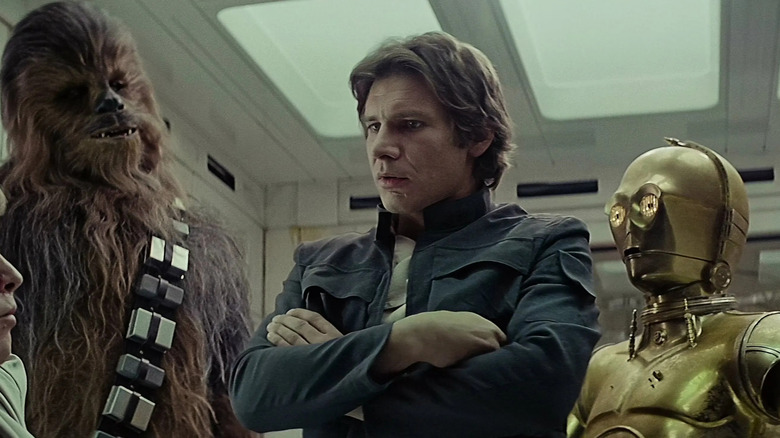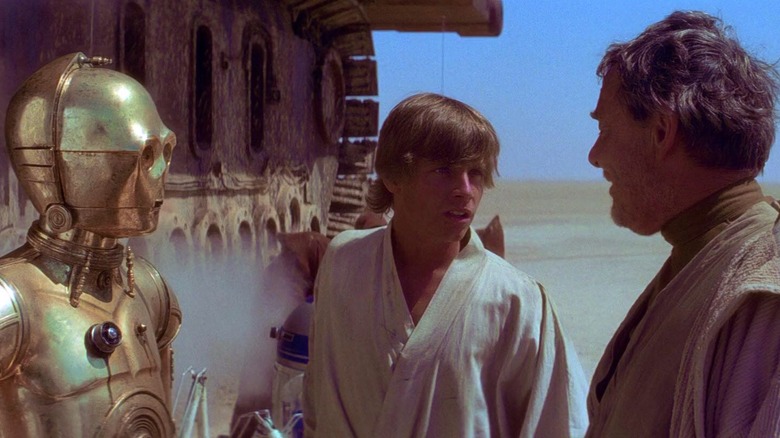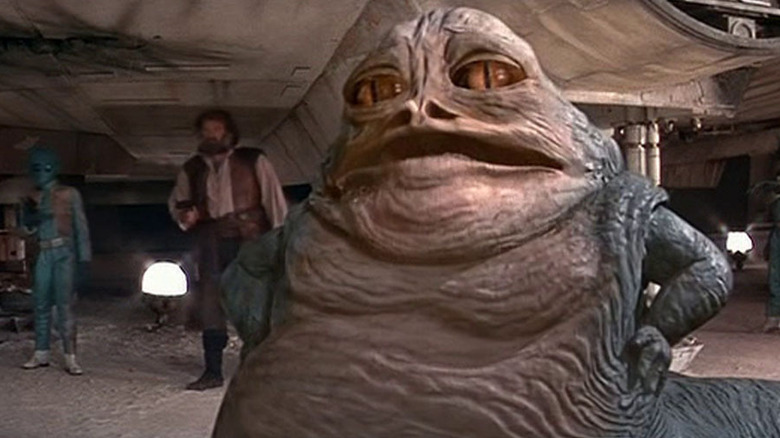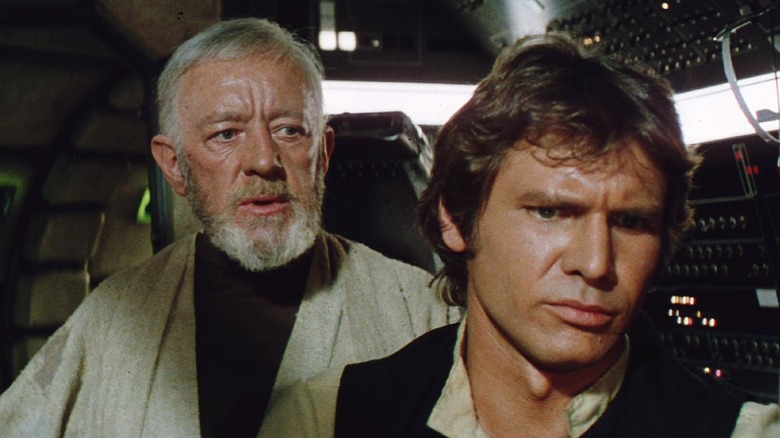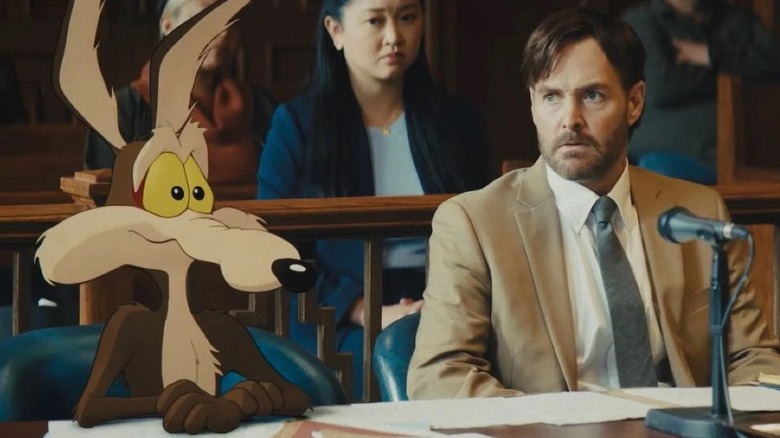Star Wars Fan Remasters And Project 4K77 Explained
The current version of "Star Wars" on Disney+ is far different from what the film looked like when it was first released.
Some of the changes have been baffling, causing years-long debates (i.e. "Han shot first"). Long-term Starwoids have become very, very annoyed by the persistent and unnecessary re-edits "Star Wars" has gone through over the years. Indeed, it seemed after the fifth or sixth re-tinkering that there would never be a "final draft" of "Star Wars," and either George Lucas or Disney would constantly recut the film to match whatever corporate mandate they were following that week. Someone actively decided to add that "McClunky!" sound effect. It's doubly frustrating that the original theatrical cut of "Star Wars" hasn't been made available to the public since 1993.
Naturally, fans have been attempting to "rescue" "Star Wars" ever since the first changes. One may not know when the very first "Star Wars" fan edit was made, but the practice of recutting "Star Wars" to one's liking is a time-honored tradition that has been practiced by Starwoids for decades. Many enterprising editors have been attempting to get back to basics in that time. Some might recall Mike J. Nichols' 2000 cut of "Star Wars: Episode I — The Phantom Menace," which cut down certain slower scenes and remixed a lot of alien dialogue, adding subtitles in their place.
Most ambitious of all: Project 4K77 is a massive undertaking that is attempting to remaster the original 1977 cut of "Star Wars" in 4K visual fidelity. This is a years-long project undertaken by non-professionals who merely want to defy corporate control of "Star Wars" and present the world with the original movie, before a slew of "improvements" were implemented, muddying the waters for archivists everywhere.
The long history of Star Wars re-edits
The makers of the film just can't stop monkeying with "Star Wars."
When the original "Star Wars" was released in 1977, 20th Century Fox released it in three different sound formats: there was a Dolby-A mix, a six-channel mix to go with the movie's 70mm prints, and a mono mix presumably made for theaters that weren't wired for stereo. Fun trivia for film archivists: there was also a silent, subtitled, black-and-white Super 8 cut of "Star Wars" that runs only 30 minutes, made for classroom presentations. It was perhaps the first time "Star Wars" would be significantly re-edited. It would not be the last.
In 1981, director George Lucas re-released "Star Wars" with a new title card declaring the movie to be "Episode IV," a baffling claim at the time, seeing as it was clearly the first movie. "Star Wars" was remastered and cleaned up when it was ported over to home video, with the Laserdisc version remixed to run at 103% speed. This was done to shorten the film and allow it to fit on a Laserdisc's limited space. The sound was upgraded to a modern THX mix and the color mixing was re-worked.
The 1995 home video versions of "Star Wars" and its immediate sequels, "The Empire Strikes Back," and "Return of the Jedi," came with an ominous note. These editions, the note said, would be the last time consumers would be allowed to legitimately purchase the original theatrical cuts of these movies. In 1997, Fox released the Special Editions of the original trilogy, which removed a great deal of the films' original special effects and replaced them with modern CGI.
For many, the Special Editions were the beginning of the end.
The dreaded Special Editions
The Special Editions were exciting at the time, as there hadn't been a remastered theatrical release of any "Star Wars" movies in years. The Special Edition of "Star Wars" also cut an old deleted scene back into the film, wherein Han Solo (Harrison Ford) has a face-to-face talk with Jabba the Hutt. As one can see in the picture above, the Special Editions featured a CGI version of slug monster Jabba and inserted him into the older footage. It also didn't look very good.
When released on DVD in 2004, the Special Editions were cut and altered again, with the previous CGI replaced with even newer CGI. The same thing happened again in 2011 when the movies were released on Blu-ray, and then again in 2019 when the 4K versions made their way onto Disney+. The many, many changes made in each edition are a matter of public record; Wikipedia even has a list.
In such a swirling miasma of re-cuts and re-jiggings, it's no wonder that "corrective" fan edits are common. In 2010, an editor named Petr Harmáček released an unauthorized edit of "Star Wars" called "Harmy's Despecialized Edition." It was a guerilla archiving project that assembled and remastered versions of the pre-1997 "Star Wars" movies. All of the CGI "improvements" were removed, and the films were made to look as much like their original release versions as possible.
"Harmy's Despecialized Edition" was the first time the theatrical cuts of the "Star Wars" movies had been presented in HD. Project 4K77 was the next logical step.
Project 4K77
The Project 4K77 website features this quote from George Lucas, made in 1997, right at the top:
"There will only be one. And it won't be what I would call the 'rough cut', it'll be the 'final cut.' The other one will be some sort of interesting artifact that people will look at and say, 'There was an earlier draft of this.' [...] What ends up being important in my mind is what the DVD version is going to look like, because that's what everybody is going to remember. The other versions will disappear. Even the 35 million tapes of 'Star Wars' out there won't last more than 30 or 40 years."
That quote was likely the source of all subsequent fan outrage about re-edits. Lucas, it seems, was determined to erase the original "Star Wars" cuts from existence, wanting his new "improved" versions to be the only ones audiences would be allowed to see. Many felt that re-edits were fine, but to erase the original cuts was an act of cultural vandalism.
In open defiance of Lucas, Project 4K77 meticulously scoured all available sources for original "Star Wars" footage and created unauthorized 1080p and UHD versions. Their website contains all the technical details and the struggles they went through. They followed Project 4K77 with Project 4K83, which improved "Return of the Jedi." They skipped over making an improved version of "The Empire Strikes Back," as a fellow guerilla editor was already tackling that project (as described on the website OriginalTrilogy.com).
The philosophy
An axiom: If a studio is unwilling to distribute or share its art, the pirate becomes an archivist.
Project 4K77's mission statement is simple and certainly relevant in 2024: corporate ownership of certain movies is not a consumer-friendly arrangement. If a company can reclaim and re-edit a film, it's a clear indicator that they have no respect for film history. Neither 20th Century Fox nor Disney seemed interested in keeping certain cuts of their movies available to the public, choosing instead to keep their shinier/uglier versions front and center. These actions weren't taken with tiny, obscure pictures no one regards. They were taken for the most popular movies of all time.
This philosophy has become even more relevant in light of the "Coyote vs. Acme" scandal at Warner Bros. That company has decided to delete an upcoming feature film from existence merely to get a tax break. The deletion of "Coyote vs. Acme" only further illustrates the gross corporate control regularly exerted over feature films. With "Star Wars," fans had had enough and made their own damn cuts. Luckily, there is an online community of fan editors that can aid in the realization of such projects. The people are taking it back from the corporations.
Note: It's been rumored that George Lucas wanted the Special Editions to supplant the original "Star Wars" movies because his ex-wife Marcia aided in the original editing, and Lucas wanted to deliberately cut Marcia out of her royalties by making new movies that were legally distinct from the originals. This is just a rumor and is not true.
